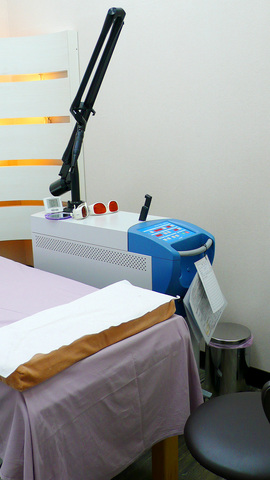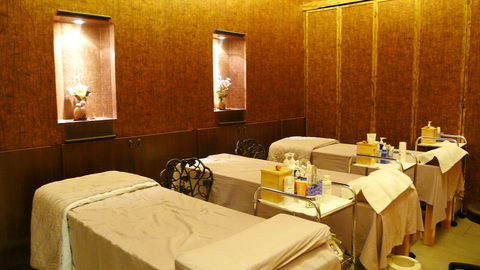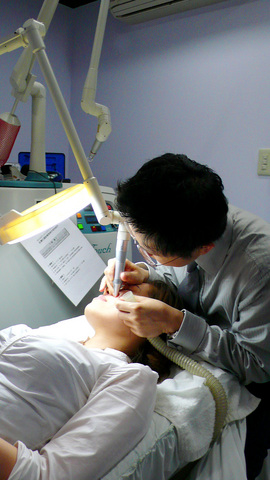"Technological progress will have an impact on human behavior," said Cheng Kuo-liang (鄭國良), director of the skin aesthetic surgery center at the Taipei Municipal Wanfang Hospital (台北市立萬芳醫院) and Cheng Kuo-liang Skin and Vein Clinic (鄭國良皮膚科診所). "If we can accept the fact that letters have been superseded by e-mails, why can't we appreciate and take full advantage of the advance of medical cosmetic technology?"
And indeed, it only takes a short walk around the fashionable district located at the intersection of Taipei's Zhongxiao East and Dunhua South Roads to see how eagerly technology has been embraced. Wherever you look there are new medical cosmetic clinics offering a variety of cosmetic laser procedures and dermatological treatments. Whatever the treatment, the sales pitch is a variation on: we'll take years off your appearance in a matter of minutes.
Whether it's hair enhancement or wrinkle reduction, skin resurfacing or rejuvenation, removal of blemishes, whitening, face tightening, contouring or treatments for vascular lesions and acne scars, the skin aesthetic medicine centers at hospitals and numerous clinics all boast that they have solutions tailored to individual needs.

PHOTOS: HO YI, TAIPEI TIMES
"Twenty- to 30-something women come to us for various moderate skin problems requiring relatively simple treatments. The majority of our clients are women aged over 40 as the signs of aging start to show. … But in recent years, we have begun to see an increase in the number of younger women seeking cosmetic procedures such as the intense pulse light (IPL) treatment and Thermage face lifts, which used to be sought by women in their 40s and 50s," said Cheng, adding that the number of male patients has also start increasing over the years, most of whom are aged over 40.
To professional "aesthetians" like Cheng, cosmetic procedures go deeper than physical improvement as they also contribute to psychological well-being, a holistic sense of aesthetic life; and on a pragmatic note, they also enhance competitiveness in the work place and social realm in general.
"While many people see medical cosmetic practices as a moral issue and denounce the obsession with appearance, I prefer to see it as part of the aesthetic economy born out of a society built on the service industry where human interactions are frequent but short and physical appearance plays an important role in social relations," said Sung Feng-i (宋奉宜), a managing director of the Chinese Society of Cosmetic Surgery and Anti-Aging Medicine (CSCSM, 中華民國美容醫學醫學會) and director of A Plus Beauty Skin and Medical Cosmetic Clinic (極緻皮膚專科暨醫學美容中心).

The takeoff of local cosmetic surgery occurred simultaneously with the technological transition from surgical, invasive treatments that require meticulous after-care and long recovery time, to non-surgical, non-invasive cosmetic procedures that have minimal or no downtime and which allow patients to immediately return to normal activities after treatments.
"In 1995, a few hospitals started to perform the glycolic peeling that marked the beginning of the medical cosmetic trend toward a one-day procedure with minimal interference with everyday life," Sung said.
It is commonly agreed that 2000 witnessed the boom in cosmetic procedures. There are a few different reasons given for this growth. First is the introduction of the non-invasive IPL photo facials and cosmetic filler injections such as botulinum toxin and hyaluronic acid injectables, which remain the most popular among both the young and the elderly.

Secondly, since the related skills and techniques are easier to pick up, and they have relatively lower risks and fewer complications, more doctors are willing to enter the field, and the increase on the supply side has stimulated the demand side, according to Sung.
Sung added that problems with the National Health Insurance (NHI) program also played a major role in the trend. "The NHI program began to crash in 2000, forcing doctors to seek alternatives to make money. Cosmetic dermatology and laser surgery was one of the lucrative options adopted by many," Sung said.
As a result, family physicians, obstetricians and gynecologists are now flooding the cosmetic surgery field previously occupied by dermatologists and plastic surgeons, and they have expressed some concern at this flood of non-specialists into a field they had previously dominated.
But to Sung and David Wang (王偉斌), chairman of Dynamic Medical Technologies (曜亞國際, DMT), Taiwan's foremost laser systems supplier, it is an unfair accusation. "Since licensed doctors are free to offer any medical service they deem proper [specialists are not licensed by Department of Health, under the Executive Yuan (行政院衛生署), but are approved by medical associations ], it is simply wrong to exclude other doctors from the field," Wang said.
Currently, no national policy exists for certifying those planning to practice cosmetic procedures and nor should there be, Sung said.
"The government can help institute channels for customers' complaints and educate the general public about cosmetic procedures or recommend training needed to conduct procedures, but it's not the government's job to decide who should practice which medical services," said a veteran dermatologist who organizes training for doctors, nurses and related professionals who want to enter the field at the CSCSM.
Indeed, for specialists who practice far more complicated and risky medical services than cosmetic procedures, all they need is training in the necessary skills. This is where CSCSM and equipment suppliers like DMT come into the picture.
"We have held training sessions, workshops and user meetings to invite professionals from home and abroad to share their expertise and experience. To ensure our clients can produce the best results is beneficial to us since the market-size will grow as customers are gradually won over by these safe and effective treatments," said the DMT chairman, adding that his organization's goal is to change the habits of consumers from purchasing skin-care products to seeing professional medical cosmetic practitioners for advice and treatment.
Yet to small clinics, making huge profits from this emerging market may be no more than a dream, as startup costs are relatively high, and at the lower end of the market, the competition is fierce.
According to DMT's president Albert Yang (楊龍和), ideally an average investment of NT$20 million is needed for a clinic equipped with the various laser systems needed to meet customers' different demands.
"Now, when patients walk into a clinic, they want total solutions. Hospitals and clinics are all vying for better and more facilities and equipment," said Chang Shao-ping (張少平), a dermatologist at the Skin Kong Wu Ho-su Memorial Hospital (新光醫院) and Venus Clinic (薇妮斯整形外科診所).
Though the medical cosmetic surgery sector may seem a tough business to some, the market itself has enjoyed healthy growth over the years. According to the chairman of DMT, Taiwan's market for injection treatments has enjoyed an annual growth rate of 30 percent while general procedures have grown 20 percent. And Sung of the CSCSM predicts the market won't reach saturation for another five to 10 years.
While Taiwan is currently well placed in this market, it cannot rest on its laurels if it is to continue attracting tourists seeking cosmetic surgery to these shores.
"Taiwan does stand at a vantage point with superior services and well-trained doctors with great skills and experience. But whether or not the idea of medical cosmetics-based tourism can materialize depends on the government's support, the collaboration between the public and private sectors and the integration of related business and industries such as spas," Cheng said.
To Sung, the situation is worrying as he believes the burgeoning medical cosmetic business is expanding at the expense of traditional medicine, as this promising trade attracts more and more young doctors seeking a way out of the NHI system.
"NHI functions like a severe winter that changes the whole eco-system since only the toughest plants can survive the harsh weather. And in the game of survival, traditional medicine is likely to lose. Sometimes I wonder how many of my colleagues in traditional medicine can resist the temptation and stay where they are," Sung said.

One of the biggest sore spots in Taiwan’s historical friendship with the US came in 1979 when US president Jimmy Carter broke off formal diplomatic relations with Taiwan’s Republic of China (ROC) government so that the US could establish relations with the People’s Republic of China (PRC). Taiwan’s derecognition came purely at China’s insistence, and the US took the deal. Retired American diplomat John Tkacik, who for almost decade surrounding that schism, from 1974 to 1982, worked in embassies in Taipei and Beijing and at the Taiwan Desk in Washington DC, recently argued in the Taipei Times that “President Carter’s derecognition

This year will go down in the history books. Taiwan faces enormous turmoil and uncertainty in the coming months. Which political parties are in a good position to handle big changes? All of the main parties are beset with challenges. Taking stock, this column examined the Taiwan People’s Party (TPP) (“Huang Kuo-chang’s choking the life out of the TPP,” May 28, page 12), the Democratic Progressive Party (DPP) (“Challenges amid choppy waters for the DPP,” June 14, page 12) and the Chinese Nationalist Party (KMT) (“KMT struggles to seize opportunities as ‘interesting times’ loom,” June 20, page 11). Times like these can

June 23 to June 29 After capturing the walled city of Hsinchu on June 22, 1895, the Japanese hoped to quickly push south and seize control of Taiwan’s entire west coast — but their advance was stalled for more than a month. Not only did local Hakka fighters continue to cause them headaches, resistance forces even attempted to retake the city three times. “We had planned to occupy Anping (Tainan) and Takao (Kaohsiung) as soon as possible, but ever since we took Hsinchu, nearby bandits proclaiming to be ‘righteous people’ (義民) have been destroying train tracks and electrical cables, and gathering in villages

Dr. Y. Tony Yang, Associate Dean of Health Policy and Population Science at George Washington University, argued last week in a piece for the Taipei Times about former president Ma Ying-jeou (馬英九) leading a student delegation to the People’s Republic of China (PRC) that, “The real question is not whether Ma’s visit helps or hurts Taiwan — it is why Taiwan lacks a sophisticated, multi-track approach to one of the most complex geopolitical relationships in the world” (“Ma’s Visit, DPP’s Blind Spot,” June 18, page 8). Yang contends that the Democratic Progressive Party (DPP) has a blind spot: “By treating any